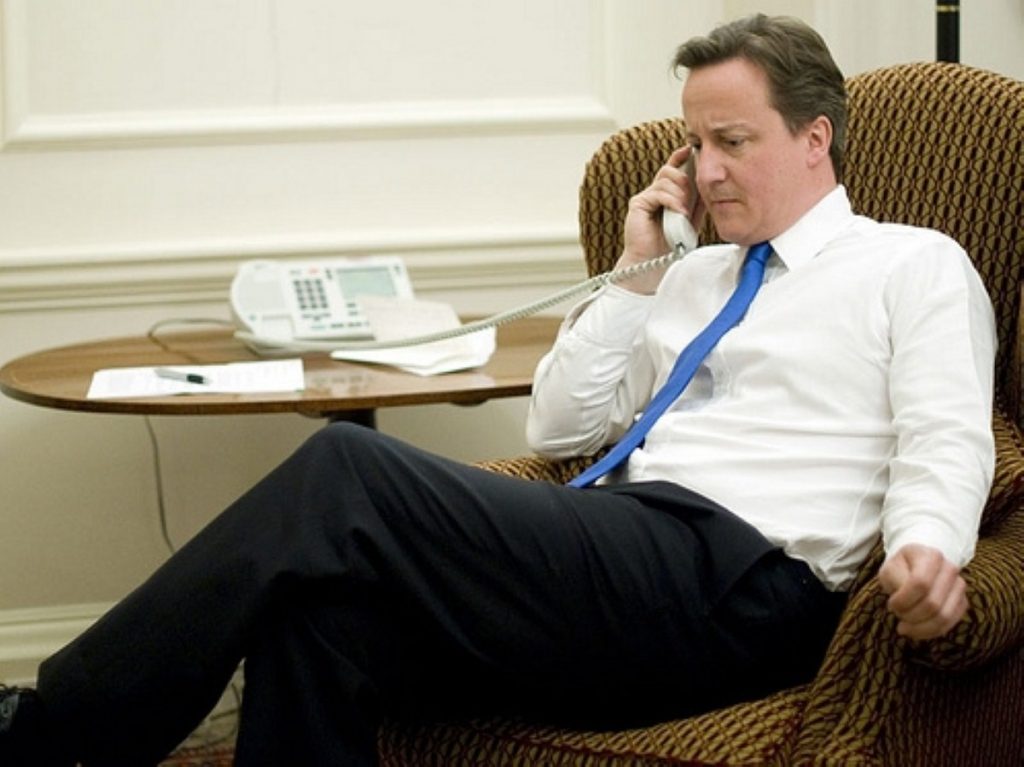Feature: Cameron’s telephone diplomacy
David Cameron has plunged into international statesmanship. Perhaps that’s why he’s taken so long putting the finishing touches to his government.
It’s tough being a new prime minister. Heads of state and assorted foreign dignitaries become desperate to make friends. Here’s a summary of the phone calls Mr Cameron has taken so far – and what was said in them.
Tuesday evening
After a quick trip to Buckingham Palace to accept the Queen’s invitation to form a government, the Conservative leader began with a very traditional phone call.
In keeping with Britain’s special relationship, the president of the United States is the first to jump on the phone. Barack Obama invited the prime minister to visit the States in July and said he couldn’t wait to see him in June at the G8 and G20 meetings. Afghanistan, the Middle East Peace Process and Iran were also discussed.
German chancellor Angela Merkel was a close second, congratulating Mr Cameron and inviting him to Berlin “at the earliest opportunity”. Ms Merkel has been desperately anxious about the implications a Tory government could have on Britain’s attitude to Europe. We wonder whether their brief chat about “the common European agenda” might have eased those fears.
There was still time for two more phone calls to come in, both from Commonwealth countries. Australian prime minister Kevin Rudd and Canadian counterpart Stephen Harper offered their congratulations shortly before midnight British time.
Wednesday
A ten-minute phone call with Indian prime minister Manmohan Singh on Wednesday morning began proceedings on Mr Cameron’s first full day in No 10. A Downing Street spokesman described their tone as “very warm and friendly”. Tory foreign policy ambitions towards emerging economic giants like India are to cultivate them extensively, so this will be viewed positively in the Foreign Office. The world economy, unsurprisingly, was the number one concern.
Here’s a bit of an interloper – Scotland hardly counts as overseas, after all. Nevertheless first ministerAlex Salmond was the recipient of a call from Mr Cameron on Wednesday morning as the latter tried to repair relations between Edinburgh and London.
Back on the global stage, and the other massive economic superpower of the 21st century was next on the list. China’s premier Wen Jiabao talked with Britain’s new premier for 15 minutes. They exchanged the usual niceties – “both leaders reinforced the strong bilateral relationship between the UK and China” – before discussing the global economic situation. Britain and China’s strategic dialogue was also mentioned.
Next on the list was the other European headache – French president Nicolas Sarkozy. The “entente amicale” might be a little less rosy if the Conservatives’ eurosceptic approach limits Britain’s interest in the European Union. But their centre-right backgrounds means there is hope for a personal connection, which diplomats appear to be placing a lot of hopes on. A spokesman said they “committed to work together on a professional and personal level to strengthen the bilateral relationship further and to build a Europe that better delivered for its citizens”. And matters were helped by an invite by Mr Cameron to Mr Sarkozy to head across the Channel for a visit on June 18th.
Thursday
After the formalities of chairing a Cabinet meeting and transporting the Privy Council to the Palace to meet the Queen the phone calls continued on Thursday. First came Pakistan, where president Asif Ali Zardari spoke to Mr Cameron “in a warm call”. Mr Cameron was especially keen on welcoming Pakistan’s efforts to tackle the insurgency within its borders, No 10 said. Inevitably they discussed Afghanistan.
A slightly less perilous region of the world was next: Scandinavia. Sweden’s prime minister Fredrik Reinfeldt and Mr Cameron pledged to build on their existing “personal friendship”. In a welcome move for those fearing Tory backward steps on the economy, No 10 said Mr Cameron “especially welcomed the progress on the European agenda that had been made under the Swedish presidency of the European Union last year”.
In a break for Mr Cameron, it was deputy prime minister Nick Clegg’s turn to take a call. He talked with the United States’ vice president Joe Biden, who “congratulated Mr Clegg warmly on his entry into government”.
Mr Clegg had expressed a desire for British foreign policy to move away from a reliance on the US during the general election campaign, which may have explained the charm offensive. “The deputy prime minister stressed that the US and the UK acting in harness could make a dramatic difference,” Downing Street said. Mr Clegg’s previous rhetoric had been focused on the difference a coherent EU stance could make on the world stage.
This means a common strand has emerged from the early phone calls: the placating of concerns. While Mr Cameron’s efforts have been focused on dampening the concerns of European leaders worried by his party’s natural suspicion of the EU, Mr Clegg has been deployed to backtrack on his party’s own views towards the US. Mr Clegg and Mr Biden “agreed to stay in close contact”.
Friday
The phone calls have kept coming. Jens Stoltenberg, the Norwegian prime minister, discussed climate change, international development and energy cooperation. Then, in the first Middle Eastern phone call, Mr Cameron talked to the King of Jordan, Abdullah II bin al-Hussein.
This, it appears, was no coincidence. “The prime minister underlined that Jordan was the UK’s key partner in the region.”





-01.png)